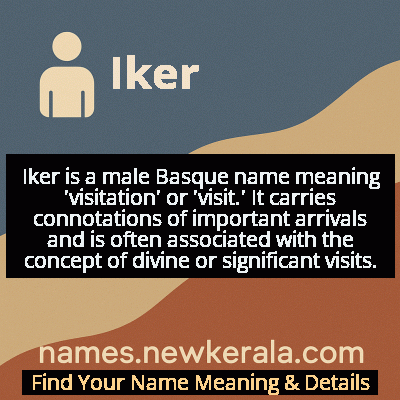Iker Name Meaning & Details
Origin, Popularity, Numerology Analysis & Name Meaning of Iker
Discover the origin, meaning, and cultural significance of the name IKER. Delve into its historical roots and explore the lasting impact it has had on communities and traditions.
Name
Iker
Gender
Male
Origin
Basque
Lucky Number
7
Meaning of the Name - Iker
Iker is a male Basque name meaning 'visitation' or 'visit.' It carries connotations of important arrivals and is often associated with the concept of divine or significant visits.
Iker - Complete Numerology Analysis
Your Numerology Number
Based on Pythagorean Numerology System
Ruling Planet
Neptune (Ketu)
Positive Nature
Intuitive, analytical, spiritual, and inquisitive.
Negative Traits
Secretive, reserved, aloof, and can be overly critical.
Lucky Colours
Green, yellow.
Lucky Days
Monday.
Lucky Stones
Cat’s eye, moonstone.
Harmony Numbers
1, 5, 6.
Best Suited Professions
Scientists, researchers, spiritual leaders, detectives.
What People Like About You
Depth of knowledge, analytical skills, spirituality.
Famous People Named Iker
Iker Casillas
Footballer
World Cup-winning goalkeeper and Real Madrid legend
Iker Martínez
Sailor
Olympic medalist and Volvo Ocean Race winner
Iker Jiménez
Journalist
Host of Spain's popular mystery program 'Cuarto Milenio'
Iker Guarrotxena
Footballer
Professional midfielder for Athletic Bilbao and other Spanish clubs
Name Variations & International Equivalents
Click on blue names to explore their detailed meanings. Gray names with will be available soon.
Cultural & Historical Significance
The name's explosive popularity, particularly following the football success of Iker Casillas, demonstrates how cultural symbols can transcend their original contexts. Iker became not just a Basque name but a Spanish name, and eventually an internationally recognized one. This transformation reflects the complex relationship between regional identities and national culture in contemporary Spain. The name serves as a bridge between traditional Basque values and modern global consciousness, embodying the successful navigation of cultural preservation alongside integration into broader societal frameworks.
Extended Personality Analysis
People named Iker are commonly associated with leadership qualities, emotional intelligence, and a strong sense of responsibility. They often exhibit natural charisma that draws others to them, combined with a pragmatic approach to problem-solving. The name carries expectations of reliability and steadfastness, influenced by the public perception of famous bearers like Iker Casillas, whose calm demeanor under pressure became legendary. These individuals are typically seen as team players who can also take charge when necessary, balancing collaboration with decisive action.
Beyond the athletic associations, Ikers are often perceived as culturally aware individuals who value their heritage while embracing modernity. They tend to be adaptable and open-minded, yet grounded in strong personal values. The name suggests someone who is both traditional and innovative - capable of honoring the past while looking toward the future. This duality makes Ikers particularly effective in roles requiring cultural sensitivity and the ability to navigate complex social landscapes. Their personality is frequently described as having a quiet confidence rather than overt arrogance, making them respected rather than merely popular figures in their social and professional circles.
Modern Usage & Popularity
In contemporary naming practices, Iker maintains strong popularity throughout Spain and has gained significant traction in Latin American countries. The name peaked in usage during the 2000s, coinciding with Iker Casillas's most successful football career years, demonstrating the powerful influence of sports celebrities on naming trends. While its popularity has slightly moderated from these heights, it remains a fashionable choice that appeals to parents seeking a name that is both culturally distinctive and internationally accessible. The name's appeal crosses social and regional boundaries, being equally popular in urban and rural areas, and among families with and without Basque heritage. Its modern usage reflects a broader trend toward embracing regional names as symbols of cultural diversity within unified national identities. Current data shows Iker consistently ranking in the top 50 male names in Spain, with particularly strong representation in the Basque Country and Madrid.
Symbolic & Spiritual Meanings
Symbolically, Iker embodies the concept of cultural bridges and successful integration. The name represents how regional identities can maintain their distinctiveness while contributing to and enriching broader national and global cultures. It symbolizes the idea of visitation not just in the literal sense, but as representing important cultural exchanges and the arrival of new ideas while respecting tradition. The name carries connotations of reliability and protection, much like a goalkeeper safeguarding the goal, making it symbolic of security and steadfastness in relationships and commitments. Additionally, Iker represents the modernization of traditional cultures - showing how ancient linguistic elements can find new relevance and popularity in contemporary society. It serves as a metaphor for cultural resilience and the successful navigation of identity in an increasingly globalized world, where local traditions and international influences must coexist and enrich each other.

